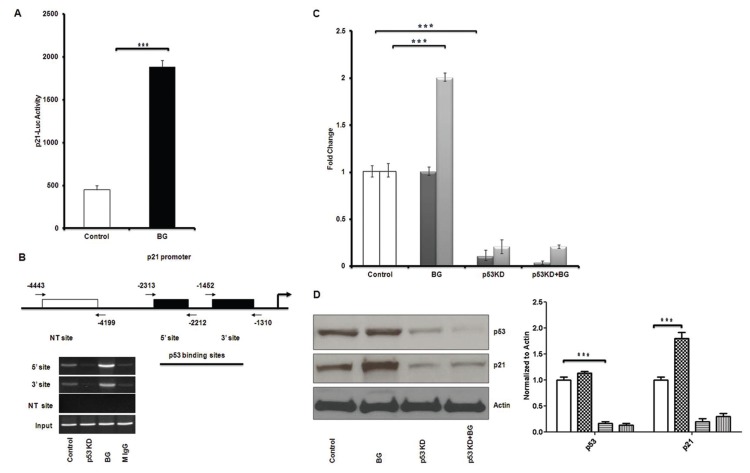Figure 4.
Benzylguanine enhances p53 recruitment to p21 promoter and induction of p21 is p53 dependent. (A) Tamoxifen-resistant MCF7 breast cancer cells were transfected with p21-luc construct and 6 h later treated with BG for 24 h. p21 transcriptional activity was increased significantly by BG. (B) Tamoxifen-resistant MCF7 cells were transfected with NT siRNA and p53 siRNA and 48 h later treated with BG for another 24 h before harvest for ChIP assay. BG increased p53 recruitment to p21 promoter on both 5′ and 3′ sites—explaining why the MGMT p53 mediated inhibition does not require increased p53 expression (Figure 3C). Silencing p53 by siRNA showed no p53 binding to the p21 promoter. (C) Tamoxifen-resistant MCF7 cells were transfected with NT siRNA or p53 siRNA and 24 h later treated with BG for 48 h before cells were harvested and Western blot analysis was performed. BG increased p21 protein expression in tamoxifen-resistant MCF7 cells significantly. p21 protein expression was decreased significantly when p53 was silenced independent of BG presence. There was no change in p53 expression in the presence or absence of BG. (p53 [
 ]; p21 [
]; p21 [
 ]). (D) Tamoxifen-resistant MCF7 cells were transfected with NT siRNA and p53 siRNA and 24 h later treated with BG for another 48 h before harvest for real time PCR, using total RNA. BG significantly induced p21 transcription in tamoxifen-resistant MCF7 cells and p21 transcription was decreased significantly when p53 was silenced, independent of BG presence. (Control [□]; BG [
]). (D) Tamoxifen-resistant MCF7 cells were transfected with NT siRNA and p53 siRNA and 24 h later treated with BG for another 48 h before harvest for real time PCR, using total RNA. BG significantly induced p21 transcription in tamoxifen-resistant MCF7 cells and p21 transcription was decreased significantly when p53 was silenced, independent of BG presence. (Control [□]; BG [
 ]; p53 KD [▤]; p53KD + BG [▥]).
]; p53 KD [▤]; p53KD + BG [▥]).

